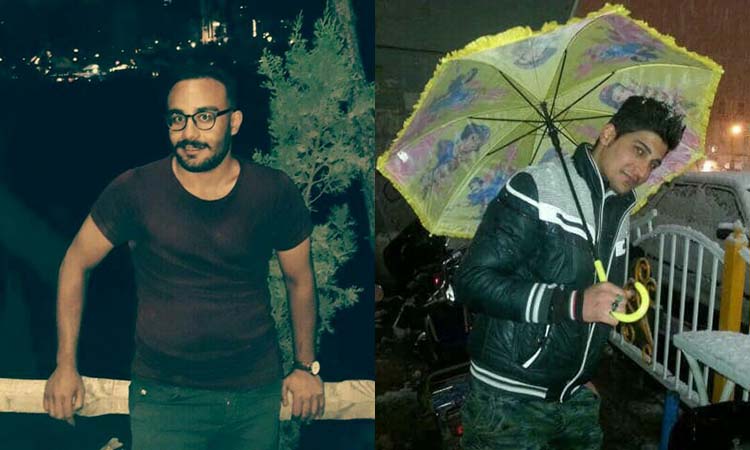Detained Iranian Protesters Told to Admit Being Drug Addicts to Speed Up Release

Vahid Heydari (right) and Sina Ghanbari were killed in the detention center
Detainees arrested during the protests that began in Iran in December 2017 have been told to tell officials that they’re drug addicts, the Center for Human Rights in Iran (CHRI) has learned.
In mid-January 2018, a lawmaker in Tehran publicly stated that detained protesters were being forced to take “pills.” Soon after, a prominent human rights lawyer told CHRI that detainees in Evin Prison in Tehran had been told to request methadone—a drug used to treat opioid dependence—to speed up their release.
Iranian authorities have claimed that two recently deceased detainees—Vahid Heydari and Sina Ghanbari—committed suicide while in custody. Officials also accused both men of being drug addicts.
“Based on statements by the relatives of one of the detainees who died in prison, he had contacted them from prison several times to say that he and the detainees were being forced to take some pills that made them sick,” tweeted member of Parliament Mahmoud Sadeghi on January 16.
Human rights attorney Nasrin Sotoudeh told CHRI that her conversations with several detainees in Evin Prison have led her to suspect a systematic attempt to “paint the protesters as addicts.” She also called for an investigation of the cases involving detainees who have died in custody.
“I received several calls from detainees from prison and they all told me the same story,” Sotoudeh told CHRI on January 17.
“Before meeting a prison official in one of the rooms, security agents talked to the detainees in advance and recommended that if the official asked them about needing anything, they should say they are addicts and ask for methadone so that they would be freed sooner,” she added. “One of the prisoners told me that he did not fall for it but some of the others did agree to say it [that they are addicts].”
“Instead of answering questions surrounding the deaths of detainees, the officials have taken an aggressive posture and their addiction charges have wounded the heartbroken families of the dead protesters and the public,” she said.
“This brings up the worrying possibility that this is part of a project to paint the protesters as addicts in order to dismiss them as unimportant and insincere,” said Sotoudeh, who was imprisoned for three years for peacefully engaging in her profession.
Sotoudeh also noted that officials are legally responsible for the health and wellbeing of detainees regardless of their medical condition.
“It must be emphasized that the law does not care if detainees are addicts or not,” she said. “They are in the hands of judicial authorities, who are responsible for their lives. In other words, whether the addiction branding project is true or not, the judiciary is responsible for what happens to detainees in custody.”
Defaming the Detainees
Officials accused both Ghanbari and Heydari of being drug addicts when news of their deaths in custody was publicized.
Ghanbari, 23, was arrested on December 31, 2017, during protests in Tehran and taken to Evin Prison. A week later, judicial officials claimed he committed suicide in the bathroom of the prison’s quarantine unit on January 6, 2018. His body was delivered to his family on January 9.
“This individual who committed suicide was an addict and the film also exists,” said Prosecutor General Mohammad Jafar Montazeri on January 11.
Heydari, 22, died in detention at the 12th Police Station in the city of Arak, Central Province, sometime between the end of December 2017 and the beginning of January 2018.
“This person [Vahid Heydari] had several criminal records for carrying drugs,” claimed Central Province Prosecutor Abbas Ghassemi on January 10, adding that there were “signs of self-beating on this individual.”
Heydari’s lawyer, Mohammad Najafi, told CHRI the authorities are trying to cover up the real reason for his client’s death by claiming he committed suicide.
“This young man was a protester,” said Najafi. “They arrested him and then they beat and killed him. Now they want to destroy his reputation.”
Heydari’s family has also denied claims that the young man carried or sold drugs.
In a statement on January 18, the State Prisons Organization threatened to take “legal action” against those who state that detainees were forced to take pills.
“Following the publication of statements by some individuals about detainees being forced to take pills, the public relations office denies and rejects these baseless claims and the State Prisons Organization will immediately take legal action against those who mention such lies and outrageous accusations,” said the statement.
Following the outbreak of anti-government demonstrations in Iran on December 28, 2017, various officials described the protesters as “saboteurs,” “vultures,” “garbage” and “opportunists.”
On January 13, Tehran Prosecutor Abbas Jafari Dowlatabadi claimed the protesters were mostly young people from economically disadvantaged social classes.
“Most of the detainees are between 18- and 35-years old and from lower classes of society,” said Dowlatabadi during a meeting with assistant prosecutors in Tehran. “Moreover, among the detainees, there were no members of the elite, or if there were, there were very few.”
Sotoudeh and CHRI have called for an independent investigation of all cases involving detainees who died in custody.
“An independent committee should investigate the veracity of these claims because such acts are clear violations of basic human rights,” Sotoudeh told CHRI.
“If these protesters’ deaths were not caused by the authorities or conditions at the facilities where they were held, then the judiciary and state officials have no reason to impede an independent investigation,” said CHRI’s Executive Director Hadi Ghaemi on January 11.






